الأسواق
عند تصميم تدخل إنساني وتحديد ما إذا كان سيتم استخدام المساعدات النقدية والقسائم، يجب أن يكون تحليل السوق جزءًا من تحليل الاستجابة الشامل. وثبت أن دعم الأسواق للعمل بشكل جيد يؤدي إلى تعافي أسرع وزيادة المرونة في المناطق المتضررة من الكوارث.
واستثمرت العديد من المنظمات في تطوير أدوات لدعم تحليل السوق وتفكر في البرمجة القائمة على السوق بشكل أكثر شمولية. يشمل ذلك التدخلات التي تستخدم السوق (مثل التحويلات النقدية إلى السكان المتضررين)، بالإضافة إلى التدخلات التي تدعم الأسواق بشكل مباشر (مثل المنح المشروطة للمتداولين لإعادة تشغيل أسواقهم).
Related initiatives
Featured content

Introduction to Market Analysis
دورة تدريبية
This 30 minute online course provides an introduction to the analysis of markets in emergency contexts, with input from some of the world’s leading thinkers on the topic.

A Practical Guide to Market Analysis in Humanitarian response
دورة تدريبية
A three to four hour online course designed to provide future humanitarian market assessment team members with a solid understanding of theory and steps of market assessments so that they can join assessment teams prepared with a basic understanding of what they will be doing and why.
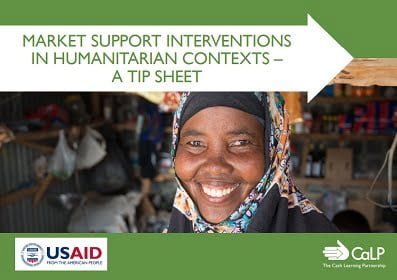
Market Support Interventions in Humanitarian Contexts – a Tip Sheet
Guidelines and Tools
This tip sheet defines what market support programming in humanitarian contexts is, and what it can look like in practice. It enables humanitarian practitioners to systematically consider market support interventions alongside other programme activities. The scope includes support interventions focusing on supply/availability and on demand/access. The tip sheet is based on secondary data...
Latest

ACTION PLAN: Initiating Linkages between Humanitarian Multi-Purpose Cash Assistance (MPCA) and MoLSA’s Social Protection Network (SPN) in Iraq
Guidelines and Tools
On 17-18 April 2018, a two day workshop was held in Baghdad aimed at strengthening linkages between Cash Working Group (CWG) humanitarian multi-purpose cash assistance (MPCA) and the Government of Iraq’s Ministry of Labor and Social Affairs (MoLSA) Social Protection Network (SPN). The event occurred...

Improving the Coordination of Humanitarian Cash Transfers – a Fool’s Errand?
Report
Master’s thesis – NOHA Master’s in International Humanitarian Action. This thesis evaluates the extent to which attempts to improve the coordination of multi-purpose cash transfers (MPCTs) in humanitarian contexts can succeed. The first part of the paper focusses on outlining the existing...

Feasibility Study on Cash Transfer Programming for the Returnees and the Host Communities in Gedeo and West Guji in Ethiopia
Report
This document reveals the outcome of a feasibility study on cash transfer programming targeted for the returnees and the host communities in Gedeo and West Guji Zones.
The major objectives of the study were as follows:
1. Understand general cash transfer environment in Ethiopia
2. Validate the needs of...
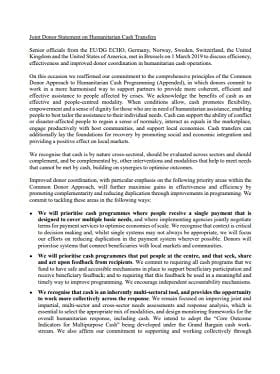
Joint Donor Statement on Humanitarian Cash Transfers
Guidelines and Tools
As part of continuing efforts to strengthen donor coordination on cash, a group of senior officials from major donor agencies (EU/DG ECHO, Germany, Norway, Sweden, Switzerland, the United Kingdom and the United States of America) met in Brussels on 1 March 2019 to discuss shared approaches. Building on...

Guide to Cash and Voucher Assistance and Gender-based Violence Resources
Guidelines and Tools
This one-page guide helps practitioners understand how three complementary resources support the integration of CVA and GBV prevention, mitigation and response to strengthen humanitarian response. It aims to help users make decisions on when to use each resource at different stages of work and compares:
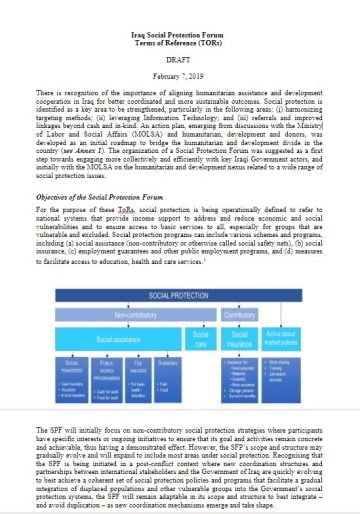
Iraq Social Protection Forum – Terms of Reference (TORs)
Guidelines and Tools
There is recognition of the importance of aligning humanitarian assistance and development cooperation in Iraq for better coordinated and more sustainable outcomes. Social protection is identified as a key area to be strengthened, particularly in the following areas: (i) harmonizing targeting methods;...

Celebrating Three Years of Membership and 10 New Members
Blog Post
It has been three years since the CALP Network first expanded its membership beyond its 'founding five' members. We welcome in the new year with the addition of 10 new members, bringing our total number to more than 80.
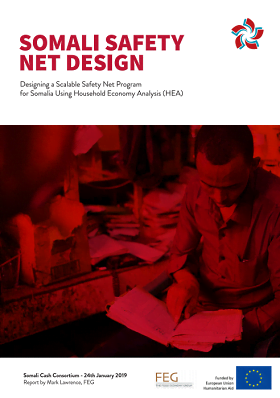
Somali Safety Net Design: Designing a Scalable Safety Net Program for Somalia Using Household Economy Analysis (HEA)
Report
The aim of the study was to use existing household economy analysis (HEA) data to help in the design of a scalable cash-transfer-based safety net program for Somalia. The study made use of a recently completed 15-year (30-season) time series analysis covering 13 livelihood zones in Somalia.

Rapid Assessment of Markets: World Vision Ecuador
Case Study
Information was collected in 7 cities which were selected because they have the highest Venezuelan population, and there are no other NGOs collecting similar information. Population surveyed corresponds to the Venezuelan population, complemented with interviews conducted in markets and houses where the...

ESSN Programme Technical Analysis
Report
The Technical Analysis study has been conducted with the aim of referring the individuals in the ESSN Programme beneficiary pool to the livelihoods in terms of its scope and content. With the purpose of increasing beneficiaries’ economic and social resilience and self-sufficiency by reducing their...
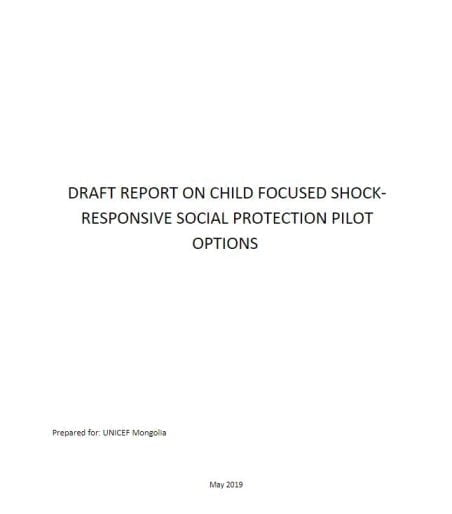
Draft Report On Child Focused Shock-responsive Social Protection Pilot Options
Report
UNICEF seeks to work together with other development partners to support the Government of Mongolia (GoM) to pilot a shock-responsive social protection (SRSP) program in order to demonstrate the value of mainstreaming SRSP into the national social protection system and to generate lessons on whether and...
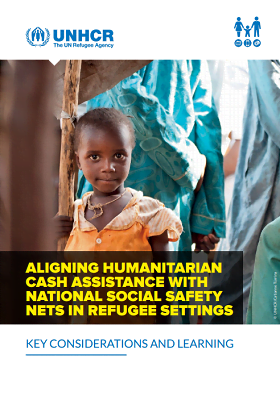
Aligning humanitarian cash assistance with national social safety nets in refugee settings
Report
UNHCR’s research on Aligning Humanitarian Cash Assistance with National Social Safety Nets in Refugee Settings – Key Considerations and Learning provides guidance on how operations have or could progressively align humanitarian cash assistance for refugees to national social safety nets and the...
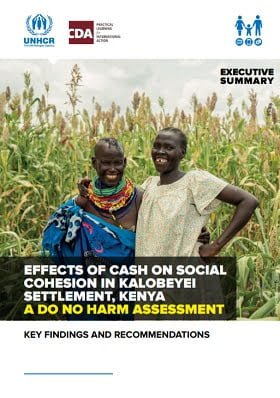
Effects of Cash on Social Cohesion in Kalobeyei Settlement, Kenya – A Do No Harm Assessment – Executive Summary
Report
The document outlines key findings on the effects of cash on social cohesion between refugee and host communities, and some considerations when planning cash assistance. The research was carried out by CDA Collaborative Learning Projects, founder of the Do No Harm Framework. UNHCR’s cash for shelter...

Kızılaykart Cash Based Assistance, Information Note
Report
Following the first refugee wave in May 2011, refugees from Syria has continued to seek asylum in Turkey. As a result of the open-door policy between 2011 and 2015, Syrians were welcomed by the Turkish government and obtained legal status under temporary protection. Subsequently, Turkey is hosting more...
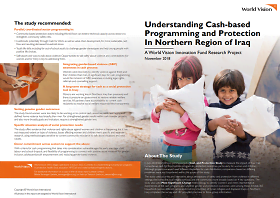
Understanding Cash-Based Programming & Protection in the Northern Region of Iraq-KRI
Report
Cash and Protection Study on impact of CVA (food security focus) on protection outcomes, particularly for women and children.
The study used a survey and interviews about perceptions of safety and protection from violence in different settings: the home, the local neighbourhood, and the community more...
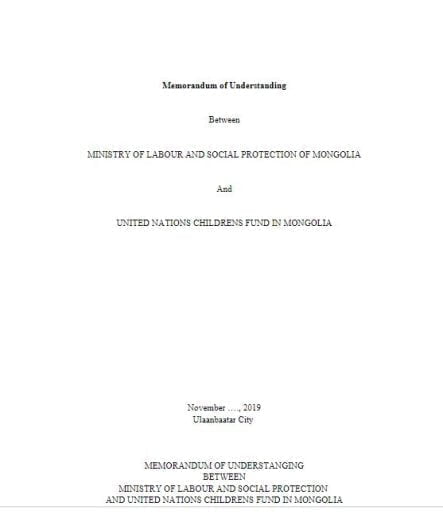
Memorandum of Understanding Between Ministry Of Labour And Social Protection Of Mongolia And Unicef
Guidelines and Tools
This Memorandum of Understanding (MoU) sets forth the terms and understanding between the MLSP and UNICEF Mongolia to collaborate to implement a Child-focused Shock-Responsive Social Protection (SRSP) Pilot (the Climate Emergencies Child Grant), which will be separate from but based on the implementation...

Can cash transfers in humanitarian contexts help prevent, mitigate, and respond to gender-based violence? A review of the evidence
Report
Today, approximately 10 percent of humanitarian assistance globally is delivered via cash transfer programming (CTP) and cash is increasingly being scaled across the humanitarian system. Yet the use of cash within the protection sector trails behind the use of cash in all other sectors. Refugee and...

Building Evidence to inform the Effective Use of CASH and Voucher Assistance in Emergency Sanitation and Hygiene Programming
Report
An analysis of 5 case studies of utilization of CASH/Voucher Assistance are presented and analysed in the attempt of building evidence on their utilization in emergency WASH Sanitation and HP programming. Findings and recommendations are provided on Coordination, Situation and Response Analysis, Program...
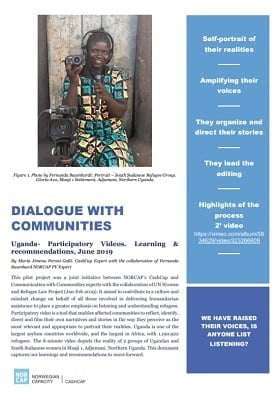
Learning from the Participatory Video in Uganda
Report
Brief lessons learned document of our journey using Participatory Videos (PV) in Uganda. We asked ourselves key questions, and share some tips. What inspired us? Why PV? With PV you take the backseat, are we prepared? What was the role of CashCap & partners? Bottom-up or business as usual? We have raised...

The Digital Lives of Refugees: How displaced populations use mobile phones and what gets in the way
Report
GSMA in partnership with UNHCR conducted quantitative surveys and qualitative research to understand the ways in which refugees are using mobile phones in order to help guide digital interventions by humanitarian organisations and mobile network operators. The research identifies key trends, statistics,...